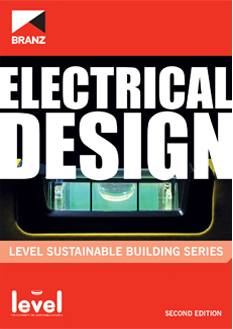
Level: Electrical design (2nd edition)
From
$30.00
Product Description
This popular publication gives designers and electrical contractors guidance around designing and specifying electrical and other cabling in domestic buildings. It pays particular attention to energy efficiency and homeowner comfort while reducing household running costs.
This publication covers:
- Building Code and standards requirements
- power supply system design
- internal electrical wiring
- wiring layout and installation
- low voltage systems.
Disclaimer: Please note that our publications reflect the regulations and best practices on the date of release, which is shown on the publication. As regulations and industry standards evolve, we always recommend that our publications be read in conjunction with the latest building code clauses and standards.
| Publication date | 1 May 2017 |
|---|---|
| Author | Greg Hoskins |
| Product type | Book |
| Availability | Available |
| Product code | BK188 |